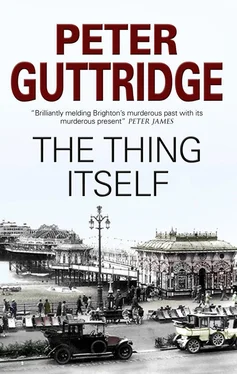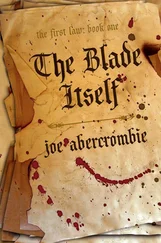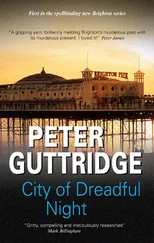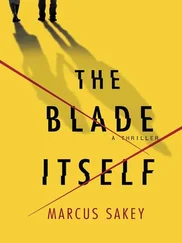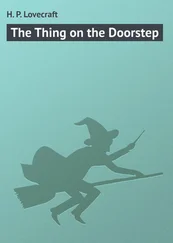Peter Guttridge - The Thing Itself
Здесь есть возможность читать онлайн «Peter Guttridge - The Thing Itself» весь текст электронной книги совершенно бесплатно (целиком полную версию без сокращений). В некоторых случаях можно слушать аудио, скачать через торрент в формате fb2 и присутствует краткое содержание. Жанр: Триллер, на английском языке. Описание произведения, (предисловие) а так же отзывы посетителей доступны на портале библиотеки ЛибКат.
- Название:The Thing Itself
- Автор:
- Жанр:
- Год:неизвестен
- ISBN:нет данных
- Рейтинг книги:5 / 5. Голосов: 1
-
Избранное:Добавить в избранное
- Отзывы:
-
Ваша оценка:
- 100
- 1
- 2
- 3
- 4
- 5
The Thing Itself: краткое содержание, описание и аннотация
Предлагаем к чтению аннотацию, описание, краткое содержание или предисловие (зависит от того, что написал сам автор книги «The Thing Itself»). Если вы не нашли необходимую информацию о книге — напишите в комментариях, мы постараемся отыскать её.
The Thing Itself — читать онлайн бесплатно полную книгу (весь текст) целиком
Ниже представлен текст книги, разбитый по страницам. Система сохранения места последней прочитанной страницы, позволяет с удобством читать онлайн бесплатно книгу «The Thing Itself», без необходимости каждый раз заново искать на чём Вы остановились. Поставьте закладку, и сможете в любой момент перейти на страницу, на которой закончили чтение.
Интервал:
Закладка:
He joined a short line of people dipping their fingers in the water in the font at the back of the church to bless themselves. When it was his turn, he had barely touched the surface of the water before he withdrew his finger sharply. The water was scalding.
He moved on and glanced back. The woman behind him dipped and made the sign of the cross with her finger on her forehead. He looked down at his burning hand. It was an engorged purple-red.
He raised an eyebrow. Ant-bites from the hide, not God’s judgement.
As he was sitting in a pew, the snake bit, doubling him over. Bile rose in his throat but he held it down, his jaw clenched tight. Maybe this was God having his say.
The two musicians were elderly peasants dressed up in their Sunday suits. The church was lit entirely by candles. Shadows pressed down on him. The service lasted an hour. Tingley wept at the beauty of it. He bowed his head when Renaldo di Bocci stepped from the front pew and walked down the aisle past him.
Di Bocci was without bodyguards. Tingley fell in step behind him, and as the church exit filled with people and progress slowed to a shuffle, he put his hands on Di Bocci’s arms and guided him a few yards off to one side. Di Bocci didn’t resist at first, though he tried to turn his head to see who was pushing him.
A couple of yards away from the rest of the congregation, Tingley stepped beside him and thrust his pistol into his side. Di Bocci half-turned his head and his eyes widened.
‘I need to know where Kadire and Radislav are,’ Tingley hissed.
‘I told you,’ Di Bocci said quietly. ‘Kadire will be in Sant’Antimo tomorrow. Radislav — I do not know.’
‘You told me that when you were lying to me. Now you will tell me the truth.’
As Tingley said this, he gripped Di Bocci tightly by the elbow, pinching the nerves, and moved him to the door behind the font. He released his grip, opened the door and pushed Di Bocci through. Di Bocci stumbled on to the marble steps at the other side of the door and fell to his knees, gasping as his shins banged against the lip of the marble.
Tingley closed and bolted the door behind him.
‘My men are waiting for me outside,’ Di Bocci said.
Tingley shook his head.
‘No one is waiting for you. Except your mistress. And she was not expecting you for another half an hour. And now she is not expecting you at all.’
Di Bocci turned awkwardly, rubbing his shin.
‘How-?’
‘-do I know all this? In betraying me, you have betrayed your cousin in Orvieto. He is not pleased.’
When Tingley had left Sant’Antimo, he had found a quiet place to pull over and telephoned Crespo’s family in Orvieto. He had told them what had happened. He had also told them he guessed that Charlie Laker had given them permission to help him and, having done so, would not be pleased that things had gone awry.
‘How do you know he did not change his mind?’ Crespo had said quietly.
Tingley had thought for a moment.
‘Not likely. But had I realized you had no control over your cousin, I would have done things differently.’
Crespo had been silent for a moment.
‘Let me call you back.’
Tingley had stayed in the car, the windows wound down, feeling the snake shift, listening to the birdsong and the cicadas, until his phone had rung again.
‘Go to Gubbio.’ It was Maria’s voice. ‘Renaldo has a mistress there. He thinks nobody knows.’
She gave him the details.
‘You would betray family? In Italy?’
She paused before replying.
‘That side of our family. . our cousin we do not regard as family.’
Now Tingley said: ‘I want to know where both Kadire and Radislav are staying and where they will be over the next couple of days.’
Di Bocci looked up at him, his dead eyes only lightly tinged with alarm.
‘You think I will tell you?’
Tingley felt the stirring. He could only nod.
PART FOUR
TWENTY-SIX
OBITUARIES
VICTOR TEMPEST, THRILLER WRITER 1913–2011. AGE 98.
Best-selling thriller writer Victor Tempest once claimed that he and Ian Fleming played baccarat for the right to author the James Bond novels. In a 1985 interview, to coincide with the publication of his bestseller, Licensed To Die , in which an unnamed secret agent commits deeds of 007-like derring-do, he stated that at a house party in the New Forest in 1946 he and Fleming came up with the idea of James Bond. Tempest claimed to have come up with the 007 code-name and ‘licence to kill’ tag, and to have invented Spectre. The Ian Fleming estate has never publicly commented.
Tempest’s own characters, including Alex Pope, have not had the longevity of Fleming’s globally recognized creation. Although popular in the 1960s, 1970s and early 1980s, Tempest’s novels are now largely forgotten.
Victor Tempest was born Donald Robert Watts in Blackburn, Lancashire, on 27 November 1913. His father, Robert Watts, was a weaver, his mother, Jennie Scott, a qualified teacher who was the daughter of a mill-owner. They had two older children, Derek and Angela.
Robert Watts was killed at the Battle of Mons at the start of the Great War and some months later Jennie moved the family to Haywards Heath, Sussex. There she worked as a teacher. She taught all her own children. She never remarried.
Donald Watts left school at 16 in 1929, just as the Great Crash led to mass unemployment. A keen sportsman — he boxed and played regularly in Sussex amateur cricket and football leagues — his fitness probably helped him pass the physical for Brighton constabulary, which he joined in 1931.
His police career was undistinguished, although he claimed that in 1934 he was one of the two police constables to discover the victim of the first Brighton Trunk Murder. They had been summoned to the railway station’s left luggage office because of a foul smell and had opened a trunk containing the naked torso of a murdered woman. Her body was never identified, her killer never found.
Watts left the force in 1936 still a constable. He was vague about how he made his living in the years between 1936 and the outbreak of war. He joined the Sussex Rifles in 1939 and was at Dunkirk, spending six hours in the water under heavy fire until a small boat rescued him.
In 1941 he joined the commandos. He saw action behind enemy lines in Greece, Italy and Yugoslavia. He was an excellent linguist. Captured in 1944, he was tortured by the Gestapo but escaped and made his way on foot back across Europe to England. This remarkable adventure formed the basis of his first best-seller, One Hour to Midnight (1957).
Back in England, he joined military intelligence, where he worked briefly with Ian Fleming. He remained in uniform until 1947 and may have reverted to his commando role in Burma (records are unclear). He certainly re-enlisted for service in the Korean War in 1950, eventually leaving the armed services with the rank of major.
He took a job as manager of a civil engineering firm in Hove but had already begun writing thrillers in his spare time. Following the success of One Hour To Midnight, he turned to writing full time. He had a string of best-sellers: Fly High Tonight, Tomorrow At Noon, The Devil’s Alliance, Spy Shroud .
His trio of spy novels featuring Alex Pope — Pope’s Prayer, Pope’s War, Pope’s Benediction — are perhaps his best-known works. In the late 1960s, Cubby Broccoli optioned them for movies that were set to star David Hemmings (the Jude Law of his day), but for reasons that are unclear negotiations broke down.
Tempest was a prolific writer and he continued to produce a string of best-sellers through the 1970s and into the early 1980s. The Berlin Inheritance, The Belgrade Intervention, The Moscow Ultimatum and The Saragossa Testament were all very popular, but the fashion for such straight-ahead thrillers slowly dwindled.
Читать дальшеИнтервал:
Закладка:
Похожие книги на «The Thing Itself»
Представляем Вашему вниманию похожие книги на «The Thing Itself» списком для выбора. Мы отобрали схожую по названию и смыслу литературу в надежде предоставить читателям больше вариантов отыскать новые, интересные, ещё непрочитанные произведения.
Обсуждение, отзывы о книге «The Thing Itself» и просто собственные мнения читателей. Оставьте ваши комментарии, напишите, что Вы думаете о произведении, его смысле или главных героях. Укажите что конкретно понравилось, а что нет, и почему Вы так считаете.
